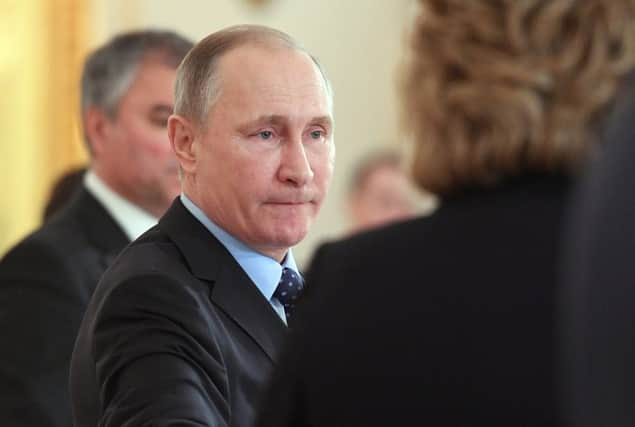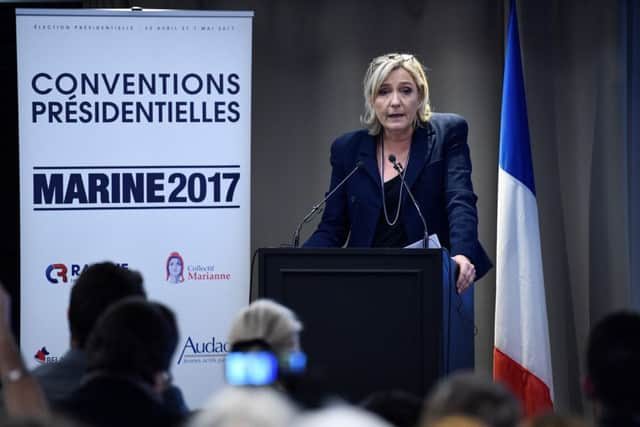Jane Bradley: reason for optimism amid world political turmoil


Without a doubt one of the most significant and earliest changes to 2017’s global political landscape, Donald Trump will officially take up the role of the 45th US president after his inauguration on 20 January. How he is likely to perform over the coming 12 months and beyond which will pre-occupy observers from around the world.
For US citizens, the burning question will be how much of the extreme rhetoric utilised in Mr Trump’s campaign will be put into practice during his tenure. His promise to replace long-fought health initiative the Affordable Care Act, aka Obamacare, with “something terrific” could instill fear into the hearts of Americans for whom the basic level policy was literally a lifeline. For global observers, Mr Trump’s decisions on everything from foreign policy to climate change will have a worldwide impact.
Advertisement
Hide AdAdvertisement
Hide AdThe impending German and French elections will serve as a barometer for the political feeling in Europe, where a growing tide of right-wing sentiment has been building in recent months.


From the Brexit vote to Mr Trump’s surprise victory to the closure of Hungary’s only neutral broadsheet newspaper, 2016 was not a good year for liberal values, sparking fears that other European nations could see far right-wing governments elected – something which has so far happened in no European country since the second world war.
In November, Marine LePen, leader of the French far-right Front National party, had a lead over Les Républicains’ former president and leader Nicolas Sarkozy in a presidential poll, in a sign that France could vote in a right-wing candidate when the country holds elections in the spring.
Meanwhile in Germany, the way the fallout from the refugee crisis continues to play out in the country is likely to have an effect on whether “Mutti Merkel”’s plummeting approval ratings will prevent her from winning a fourth term in office when the Germans go to the polls later this year.
The Berlin Christmas market terrorist attack, which killed 12 people and left dozens more injured, will raise further questions as to how Angela Merkel’s government is dealing with the terrorist threat.


Yet there were glimmers in 2016 that the liberal left in Europe is not completely dead – such as when fears that the Austrian presidential election would see Norbert Hofer of the far-right Freedom party put in power. Despite a strong performance by Mr Hofer in the first round, Austrians ultimately opted for independent, Green-backed candidate, Alexander Van der Bellen.
The Austrian result demonstrates that all is not doom and gloom in terms of right-wing movement, although Mr Trump’s victory may suggest otherwise. Watch this space.
On a more positive note, Sweden is this year set to lead the way by presenting a new national strategy to prevent and combat violence against women – a precursor to its national gender equality agency, which will be created this year before formally launching in 2018.
Advertisement
Hide AdAdvertisement
Hide AdHowever, what will interest much of Europe during 2017 is the impact of how Britain’s Brexit deal plays out once Prime Minister Theresa May triggers Article 50 by the end of March – whether a hard Brexit or a soft Brexit, a Norwegian or a Canada Brexit. Although many countries are taking an openly laissez faire attitude to the UK’s decision, there is no doubt that the effects of Britain leaving the European Union will have consequences for the entire continent.
Hopes that the conflict in Syria – or indeed, the entire refugee crisis – could come to an end are currently a pipe dream as troops controlled by president Bashar al-Assad hammered the city of Aleppo at the end of last year.
The West’s response to the crisis has come under scrutiny from protesters, while Russia is also under fire for its lack of humanitarian compassion during its military support for Mr Assad’s forces.
Refugees left homeless by the devastation taking place in Syria – as Mr Assad, backed by Russian president Vladimir Putin, bombed rebel strongholds, demolishing entire communities – will undoubtedly continue to flow west, putting even greater pressure on resources and political will in Europe.
Meanwhile, an entire generation of Syrian children, who have struggled to get an education for almost six years since the conflict began, remain in limbo as their lives are once more put on hold.
What Mr Putin will do closer to home is also a concern, with the war in eastern Ukraine continuing to rumble on.
Moldova – which is home to the self-declared Soviet Republic of Transnistria – recently elected a pro-Russian president, Igor Dodon, moving away from its previously closer relations with the West, while in Bulgaria, Rumen Radev, also pro-Russian, won the presidential race by a comfortable margin, issuing another blow to the European Union.
The assassination of Turkish ambassador Andrei Karlov in Anakara in December may also deepen tensions between Russia and other nations, with Mr Putin’s relations with Turkish president Recep Tayyip Erdogan already under pressure.
Advertisement
Hide AdAdvertisement
Hide AdIn Iran, presidential elections, due to be held on 19 May, promise further upheaval as relatively moderate incumbent Hassan Rouhani looks to face tough opposition.
Meanwhile, conflicts in both Yemen and Nigeria have left millions of people hit by famine, a crisis which looks likely to escalate in the coming months.
With no end in sight to the conflict between the government and terrorist group Boko Haram, 75,000 children in Nigeria alone are at risk of death in the first half of this year, the United Nations has warned.
Meanwhile, in Yemen, 80 per cent of the population are in need of aid after a war between forces loyal to the internationally-recognised government of president Abdrabbuh Mansour Hadi and those allied to the Houthi rebel movement has triggered a humanitarian crisis.
But while famine continues in certain areas, charity Action Against Hunger says the bright spot is that the battle to end child deaths due to hunger across the globe is slowly being won. Despite some terrible crises worldwide, progress overall is being made in battle to eradicate deaths due to the most severe form of malnutrition.
Leah Oatway, senior communications officer at Action Against Hunger UK, said that since 2000, the number of people hit by hunger has fallen by nearly 210 million.
She said: “The world finally has a credible plan to dramatically reduce the number of children who die from hunger. 2017 will be the year when we see that begin.”
Looking further east, there are more fractures as Taiwan’s first female president, Tsai Ing-Wen, has promised a future of “reform and renewal” for 2017, which will see the nation – regarded by China as a breakaway province – look to reshape its economy more independently from China, concentrating on economies in south-east Asia.
Advertisement
Hide AdAdvertisement
Hide AdHowever, she has also already forged ties with Mr Trump, in a personal phone call with him which some commentators took as a slap in the face for Beijing. It will be interesting to see whether the decision to connect the call – which Mr Trump later insisted in a tweet was instigated by Ms Ing-Wen rather than himself – was a diplomatic faux pas on the part of a president-to-be with little previous experience in foreign affairs, or an indication of new support for Taiwan from a country which withdrew its embassy from the country four decades ago.
Things got worse from then on, with a clash last month over a US drone in the South China Sea and culminating in an editorial in the Communist party-controlled China’s Global Times newspaper which claimed that the president-elect “bears no sense of how to lead a superpower”.
However, planting seeds of hope – as well as real saplings – for the future, a number of countries will continue major tree planting schemes this year in an effort to tackle climate change. India has pledged to spend the equivalent of $6 billion to reforest 12 per cent of its land, while African nations are involved in a joint programme to restore 100 million hectares of land.
It is impossible to predict exactly what 2017 will bring – we can only hope that it is calmer than its predecessor.